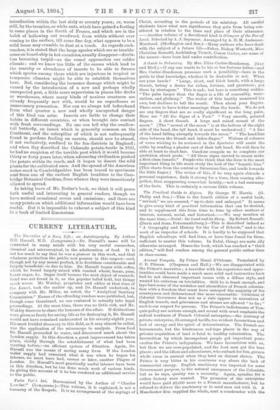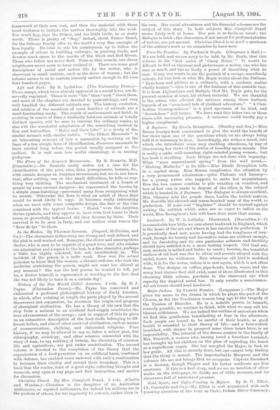Around Tonquin. By Prince Henri d'Orleans. Translated by C. B.
Pitman. (Chapman and Hall.)—We are disappointed with the Prince's narrative ; a traveller with his experience and oppor- tunities could have made a much more solid and instructive book had he not obscured important issues with a diffuse style, and wasted his criticism on trivialities. Still he is frank enough, and lays bare some of the mistakes and absurdities of French colonisa- tion with a freedom that must have annoyed the majority of his countrymen and disheartened the more reasonable. Criticism of Colonial Governors does not as a rule appear in narratives of English travels, and grievances and abuses are allowed " to lie ; " such is our respect for persons. The Prince's indictments of Ton- quin policy are serious enough, and reveal with cruel emphasis the radical weakness of French Colonial enterprise,—the jealousy of private enterprise, ill-arranged tariffs, too evident favouritism and lack of energy and the spirit of determination. The French are bureaucrats, but the hindrances red-tape places in the way of private acquisition of land is fatal to healthy colonisation. The favouritism by which incompetent people get important posts excites the Prince's indignation. We have favouritism with us, but then we are over-populated, and the best men got the best places ; and the idlers and adventurers, who embark for fun, govern whole races in earnest when they land on distant shores. The Prince is very bitter in his courteous way about the lack of commercial energy. English machinery was imported for some Government purpose, to the natural annoyance of the Colonists, but as he says, quality was a necessity. Again, spindles for a cotton factory were wanted. The promoter of the enterprise would have paid £2,000 more to a French manufacturer, but he refused to deliver the machinery or to send men out with it. A Manchester firm supplied the whole, sent a constructor with the •
framework at their own cost, and then the material with three head workmen to initiate the natives thoroughly into the work.
Too much flag, says the Prince, and too little trade, in as many words. There is plenty of "flag," indeed, about Prince Henri, for the Orleans family offer to the world a very fine example of true loyalty. He tries to stir his countrymen up to follow the example of others in building railways, in pushing trade, and devotes much space to the merits of the Black and Red Rivers.
Those who follow are never first. Trite as this sounds, our clever neighbours never seem to have realised it. There are some good descriptions of social and native life by the writer, who is observant in small matters, such as the dress of women ; but the volume seems to us to contain scarcely matter enough to fill over four hundred pages.



































 Previous page
Previous page